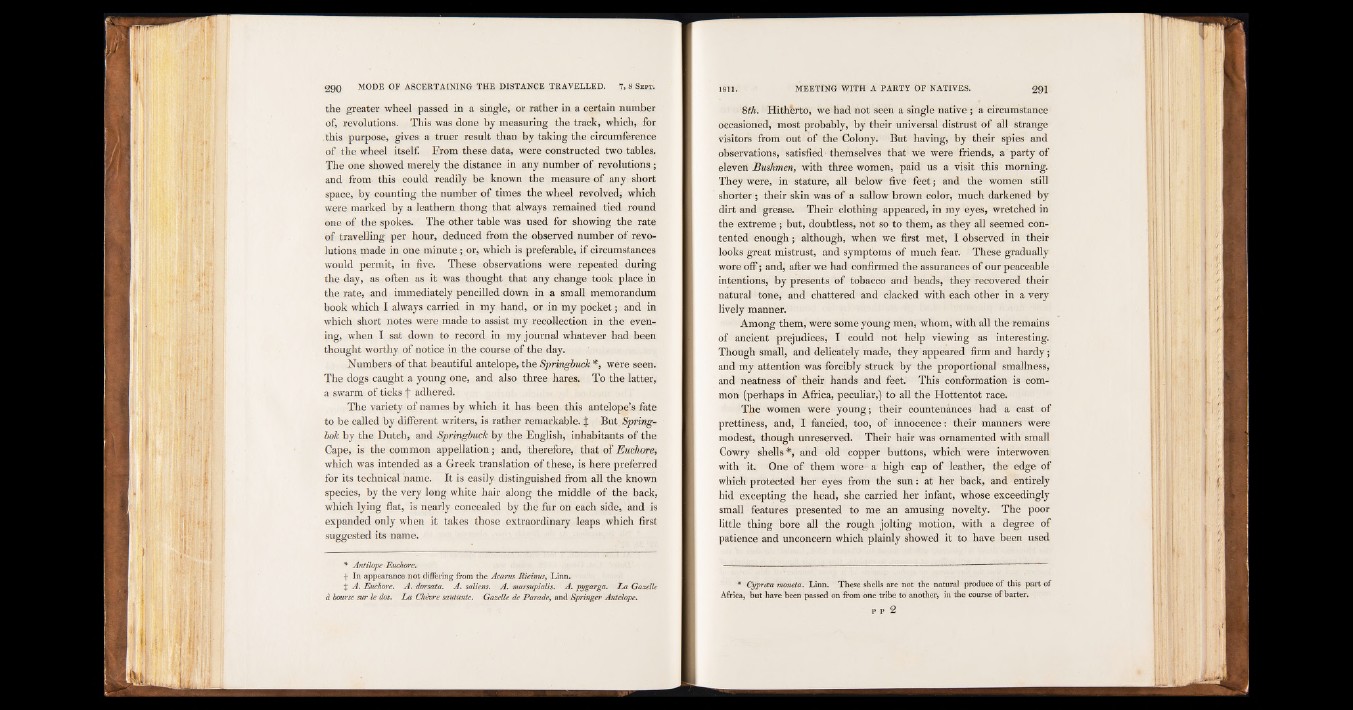
the greater wheel passed in a single, or rather in a certain number
of, revolutions. This was done by measuring the track, which, for
this purpose, gives a truer result than by taking the circumference
of the wheel itself. From these data, were constructed two tables.
The one showed merely the distance in any number of revolutions ;
and from this could readily be known the measure of any short
space, by counting the number of times the wheel revolved; which
were marked by a leathern thong that always remained tied round
one of the spokes. The other table was used for showing the rate
of travelling per hour, deduced from the observed number of revolutions.
made in one minute; or, which is preferable, if circumstances
would permit, in five. These observations were repeated during
the day, as often as it was thought that any change took place in
the rate, and immediately pencilled down in a small memorandum
book which I always carried in my hand, or in my pocket; and in
which short notes were made to assist my recollection in the evening,
when I sat down to record in my journal whatever had been
thought worthy of notice in the course of the day.
Numbers of that beautiful antelope, the Springbuck *, were seen.
The dogs caught a young one, and also three hares. To the latter,
a swarm of ticks j* adhered.
The variety of names by which it has been this antelope’s fate
to be called by different writers, is rather remarkable. J But Springbok
by the Dutch, and Springbuck by the English, inhabitants of the
Cape, is the common appellation; and, therefore, that of Euchore,
which was intended as a Greek translation of these, is here preferred
for its technical name. It is easily, distinguished from all the known
species, by the very long white hair along the middle of the back,
which lying flat, is nearly concealed by the fur on each side, and is
expanded only when it takes those extraordinary leaps which first
suggested its name.
* Antilope-Euchore.
f In appearance not differing from the Acarus Ricinus, Linn.
$ A. Euchore. A . dorsata. A. saliens. A. marsupialis. A. pygarga. L a Gazelle
à bourse sur le dos. L a Chèvre sautante. Gazelle de Parade, and Springer Antelope.
8th. Hitherto, we had not seen a single native ; a circumstance
occasioned, most probably, by their universal distrust of all strange
visitors from out of the Colony. But having, by their spies and
observations, satisfied themselves that we were friends, a party of
eleven Bushmen, with three women, paid us a visit this morning.
They were, in stature, all below five feet; and the women still
shorter; their skin was of a sallow brown color, much darkened by
dirt and grease. Their clothing appeared, in my eyes, wretched in
the extreme; but, doubtless, not so to them, as they all seemed contented
enough; although, when we first met, I observed in their
looks great mistrust, and symptoms of much fear. These gradually
wore off; and, after we had confirmed the assurances of our peaceable
intentions, by presents of tobacco and beads, they recovered their
natural tone, and chattered and clacked with each other in a very
lively manner.
Among them, were some young men, whom, with all the remains
of ancient prejudices, I could not help viewing as interesting.
Though small, and delicately made, they appeared firm and hardy;
and my attention was forcibly struck by the proportional smallness,
and neatness of their hands and feet. This conformation is common
(perhaps in Africa, peculiar,) to all the Hottentot race.
The women were young; their countenances had a cast of
prettiness, and, I fancied, too, of innocence: their manners were
modest, though unreserved. Their hair was ornamented with small
Cowry shells*, and old copper buttons, which were interwoven
with it. One of them wore a high cap of leather, the edge of
which protected her eyes from the sun: at her back, and entirely
hid excepting the head, she carried her infant, whose exceedingly
small features presented to me an amusing novelty. The poor
little thing bore all the rough jolting motion, with a degree of
patience and unconcern which plainly showed it to have been used
# Cyprcea moneta. Linn. These shells are not the natural produce of this part of
Africa, but have been passed on from one tribe to another, in the course of barter.